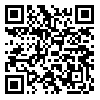Volume 4, Issue 2 (Autumn and Winter 2018)
JMIS 2018, 4(2): 1-7 |
Back to browse issues page
Ph.D.Student of health information management, Scientific and Educational Center for Health Management of Iran, Tabriz University of Medical Sciences, Tabriz,Iran
Abstract: (4532 Views)
Aim: Nowadays, cloud computing technology is widely used in health care industry because of its advantages in cost reduction and improving the availability and integrity of information. In this study, nurses' attitude towards cloud computing technology is examined in order to determine the benefits, barriers and infrastructure required for implementation.
Methods: This descriptive-analytic study was done in Farabi Hospital in 2017. The research population included nurses working in this hospital and sampling method was census (310 nurses). After completing questionnaires and entering data, SPSS-19 software used for data analyzed and Pearson and ANOVA used for hypothesistests.
Results: In this study 228 individual (181 women and 47 men) participated. The most important (+0.46/±4) advantage of using cloud computing in hospitals was easy transfer and better access to medical records. Web-based hospital software (95/5/54/3) is the most important prerequisite to use this technology. Also, the main (68/3±83/3) barrier was the inability to interoperability in clinical information systems.
Conclusion: Given the benefits of cloud computing technology, such as access to information and optimal communication between health care organizations, appropriate policy making can solve barriers, such as lack of appropriate data networks in hospitals, lack of interoperability of hospital information systems and the internet problems to implement this technology in the future.
Methods: This descriptive-analytic study was done in Farabi Hospital in 2017. The research population included nurses working in this hospital and sampling method was census (310 nurses). After completing questionnaires and entering data, SPSS-19 software used for data analyzed and Pearson and ANOVA used for hypothesistests.
Results: In this study 228 individual (181 women and 47 men) participated. The most important (+0.46/±4) advantage of using cloud computing in hospitals was easy transfer and better access to medical records. Web-based hospital software (95/5/54/3) is the most important prerequisite to use this technology. Also, the main (68/3±83/3) barrier was the inability to interoperability in clinical information systems.
Conclusion: Given the benefits of cloud computing technology, such as access to information and optimal communication between health care organizations, appropriate policy making can solve barriers, such as lack of appropriate data networks in hospitals, lack of interoperability of hospital information systems and the internet problems to implement this technology in the future.
Type of Study: Research |
Subject:
General
Received: 2018/12/20 | Accepted: 2019/03/16 | Published: 2019/03/20
Received: 2018/12/20 | Accepted: 2019/03/16 | Published: 2019/03/20
| Rights and permissions | |
 |
This work is licensed under a Creative Commons Attribution-NonCommercial 4.0 International License. |



